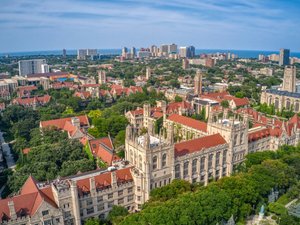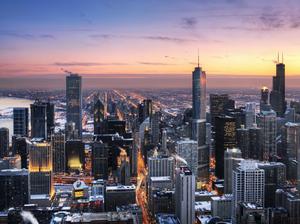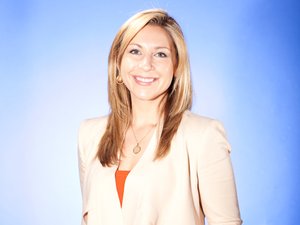Nuha Nazy and Emilia Rogowska set out to create a space that gave people the ability to quit their 9-to-5 jobs.
The duo opened the doors to Z-Axis Factory last October, a 15,000 square-foot coworking and maker space in Pilsen that had everything from a CNC machine to glass cutting tools to direct-to-garment printing. The idea was to create a space where artists and engineers alike would have access to the expensive machinery and resources necessary to creating a business around physical product startups. So far, it’s worked—they have 25 members, who range from the designers behind clothing line Miss Lynn Designs, to a woodworker creating a line of laser-cut bowties, to money counterfeiter-turned-artist Art Williams Jr.
“There’s a lot of places to go to have a cup of coffee and think about your idea, there are very few where you can go and start generating revenue,” said Nazy. “Z-Axis is that place for artists and makers in Chicago.”
Chicago has historically been a strong software and digital startup hub. But a handful of new spaces and resources are providing the infrastructure for a new type of founder: A hybrid maker-entrepreneur that’s looking to create products that can be manufactured and businesses that can scale. And their efforts are creating a new maker and tech community in Chicago.
“In the past people haven’t considered [making as a job] as much, because there haven’t been avenues to turn passions into careers,” said Bill Fienup, founder and managing director of product and manufacturing space mHUB. “But now you can monetize some of these passions.”

mHUB, the city's first space devoted entirely to product prototyping and manufacturing, is the biggest bet on this new type of entrepreneur. It's a 63,000 square foot facility in an old Motorola Mobility prototyping lab in West Town that officially opened its doors to the public in March. The expanded space also marks the hardware community's transformation from hobbyist-maker to supporting growing ventures: mHUB’s predecessor, hardware coworking space Catalyze, which Fienup also led, was packed into a small building in the West Loop overflowing with tools, workbenches and entrepreneurs hunched over prototypes.
mHUB, by contrast, is filled it with over $2.5 million in prototyping and manufacturing equipment. They also have the capability to do a small-scale manufacturing run of hardware entrepreneurs’ products, a key missing link for maker-entrepreneurs, as larger manufacturers often pass on shorter, less profitable product runs.
Many of mHUB’s current members are holdovers from Catalyze (including the founders of Curious Technologies, the startup behind concussion-detecting device NWTN, and recent finalists on America’s Greatest Makers, and Guard Llama, which was just funded on Shark Tank). But they’re growing fast—they’re up to 130 members since officially launching last month, and have capacity for 1,000. Fienup believes that the quality of startups and products is improving too (think startups from former Motorola engineers, he says).
“We’re getting those higher caliber teams because we have more advanced resources,” Fienup added.
Kickstarter cofounder Charles Adler opened the doors to his maker, tech and arts-focused space Center for Lost Arts on Goose Island last summer, with the goal of bringing the collaboration that fueled the maker movement online to a physical space. As someone who learned to code through shared resources and “barter of knowledge” in the online maker community, he knew collaboration and collision can lead to much bigger things (launching a site like Kickstarter, for example).
As a result, Lost Arts attracts an entrepreneur that’s comfortable collaborating and blurring the lines between disciplines. "People [are] sharing information about fundraising, about electronics, about product design, about marketing, about art," he said. "And it’s not necessarily artist to artist. It looks more like artist to entrepreneur or engineer to artist."
While the space may not mirror 1871, it does provide that next step for someone with a really intriguing, perhaps quirky idea, that has the opportunity to scale up: For example, one of Lost Arts' members, Roman Titus, is working on Sojourn Fare, an IoT product that helps grow mushrooms at a faster rate. He piloted his prototype at Google Chicago last summer and is partnering with a mushroom farm to increase capacity.
“For the price of the monthly membership, like a gym, you can gain access to this great community of driven people that have the ability to create something,” Adler added. “The thing you create has the potential, if the chemistry is right, to be really successful.”
That's a huge shift for younger product designers looking to launch their own venture said designer Craighton Berman: “Things are in a massively different spot than they were where I was at 12 years ago.”
Berman does graphic design projects and creates handmade housewares, such as manual coffee and teamakers (funded by several very successful Kickstarters). When he was starting out, product designers usually had to take their products to exhibitions and hope that a buyer would bite. While this still happens for top-tier, more design-focused products, new business and prototyping tools, from Kickstarter to Chicago-based Inventable's Carvey, have expanded career options for designers just getting their start.
“It's a cool reframe,” he said. “As a designer you're not necessarily a service provider. You can be a creator, a founder. Your ideas can be manifested by yourself.”
He also co-teaches the Entrepreneurial Product Development course at University of Illinois at Chicago, in which industrial design students create a product and launch it on crowdfunding sites. While most students don’t have extravagantly high funding goals (usually between $1,000 to $2,000), 39 out of the 41 projects students have launched over the last three years have been successfully funded. And this year a student from the course, Nabeeha Hussain, took the third place prize at UIC's Startup Challenge for her Abstruse wall organizer (also successfully funded on Kickstarter earlier this year).
“To see that [students] have more skills and abilities than they even knew—marketing, storytelling, mass production,” he added. “It's cool to see them cross train like that.”
At the University of Chicago-affiliated Polsky Fab Lab, assistant director Elizabeth Koprucki actually finds incoming students often already have experience with maker spaces. It can even be a selling point when deciding where to go to school.
“It’s not just about who has the nicest gym or dorm anymore,” she said. “It's, ‘what's the innovation space? What's the maker space?’”
The Polsky Fab Lab is unique in that it serves a larger community than most: It’s open to south side community members, as well as University of Chicago students, faculty and staff, which has allowed the idea of “making” expand to people who perhaps didn’t know they were makers. Startups from smart oven Tovala to self-administered HPV test 4women (competing in this year’s New Venture Challenge), have prototyped products in the space.
“When I do introductions at the beginning of a fab lab class, I could have a medical student sitting next to an undergrad in molecular engineering, [as well as] a woodworker, artist, social media marketer,” she said. “They could all be new to this. That's a way I'm hoping to connect people with different expertise and collaboration.”
And the expanded resources in the city also allow there to be more fluidity from the entry level up to entrepreneur. Koprucki, who previously worked at the Chicago Public Library’s maker space, said she’ll refer people to different spaces around the city as their needs and the capacity of the space change. And these new maker spaces are breaking down silos between the hubs scattered across the city-- mHUB just announced they're cutting membership costs in half for members of MATTER, 2112 and the Polsky Center (and vice versa).
The momentum is strong, even beyond these spaces: Long-standing hobbyist-focused maker spaces such as Pumping Station One and South Side Hackerspace are consistently growing. A food, beverage and textile maker community has popped up in the Kinzie Industrial Corridor. Bosch and 1871 are set to open an IoT incubator in May.
But as with any emerging ecosystem, there are challenges ahead. Chicago is already known to be a quieter venture community and it’s nearly silent when it comes to hardware startups, which can be more expensive to fund. Nearly all the leaders of maker spaces said funding is where startups' progress breaks down, and they’re making funding connections and programming a priority as they further build out their spaces. Issues around diversity in the larger tech community plague the maker movement as well ("I know people who joke about a stereotype of makers, that it's white guys with robots," said Koprucki).
But these challenges—creating opportunities for a wider range of entrepreneurs and getting startups the capital needed to scale—could also be seen as the natural growing pains before a tech boom.
“Maybe the [maker spaces] of the past are simply about the tools and education around those tools, or facility and education around the facility,” Adler said, while ruminating on this shift. “And the spaces of late are about greater conduit to support their greater success. The tool is one step. The orientation and education around skills with the tool is another step. But the greater potential [of] the project has been missing.”








